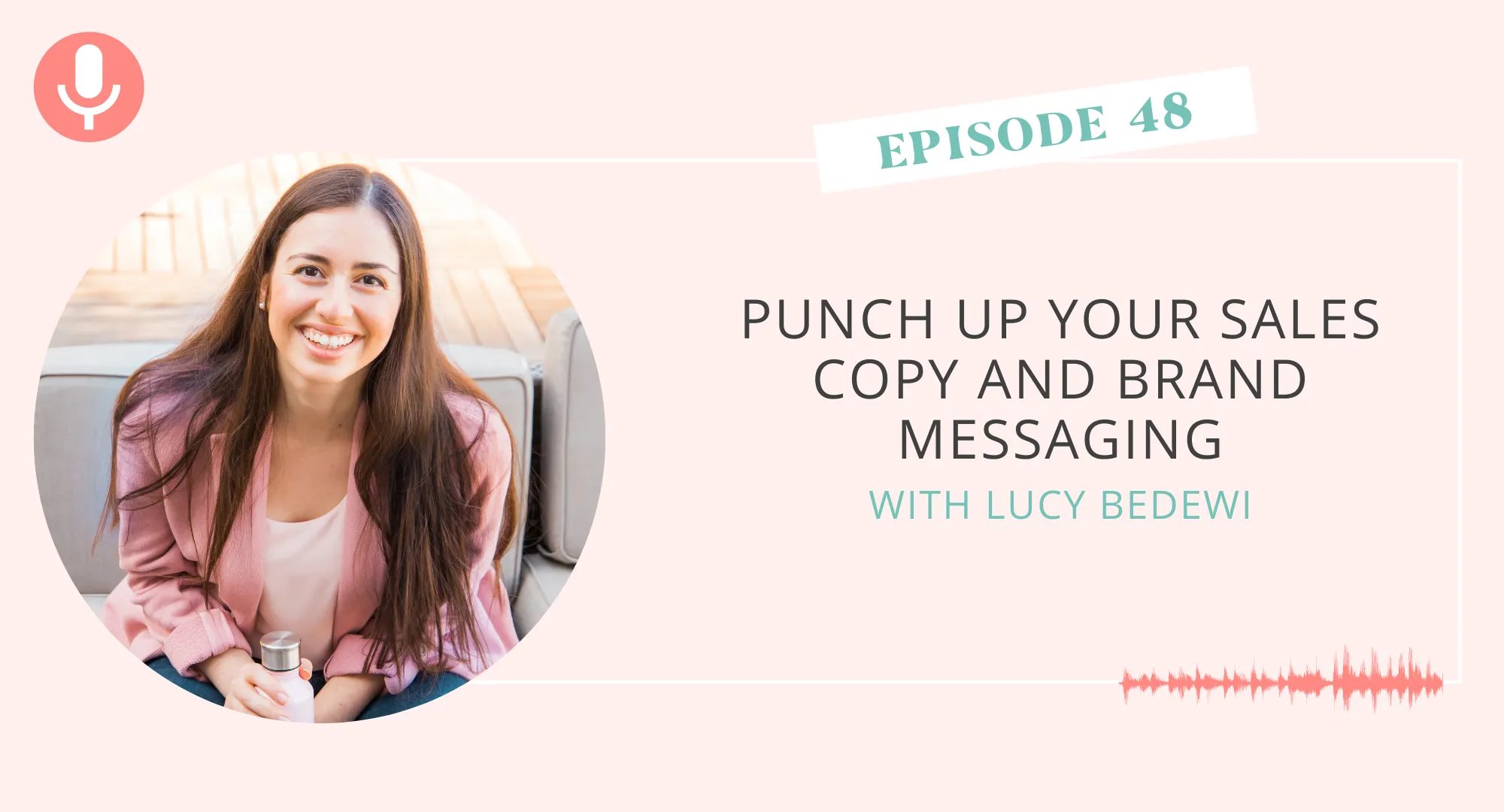Struggling to get the results you want from your emails?
Discover 15 simple yet powerful ways to elevate your email marketing and start seeing real engagement!
Grab your freebie!
Blog Categories
Helping small business owners, virtual assistants, and creative entrepreneurs grow their business.
Hi, I'm Tara! I'm a multi-passionate business and marketing coach.
learn more + get a copy:

Any copy you are using in your business can convey your personality, like being witty, feisty, fun, and informative. To take that a step further, your words can impact people in whether or not they want to work with you. Are you their person to get the job done? Your sales copy and your brand messaging are essential to help get your message across, especially as an introvert who doesn’t want to spend time showing up on discovery calls as much or videos. Sharing your voice through your words can be a powerful asset for your business.
Disclaimer: I earn from qualifying purchases. Some of the links on my website are affiliate links, which means, at no additional cost to you, I will earn a small commission if you click through and make a purchase.
Our guest on the podcast today is Copywriter Lucy Bedewi. She specializes in helping female entrepreneurs lean into their unique voices and capture their ideal clients with compelling and fun words. Her unique style has drawn many clients to her, including 7-figure coaches, global fashion brands, world-famous bakeries, booming e-commerce companies, personality-driven service providers, and tons of creative entrepreneurs. She loves sharing wisdom about messaging and encouraging other women to find their voice, lean into their personalities, and never feel the need to ‘water themselves down’.
In this episode, Lucy and I dive into:
- Her story of how she had a non-traditional start in the world of entrepreneurship
- Putting more of your personality into your own copy
- How to keep your brand tone consistent, especially as a multi-passionate entrepreneur
- The most common mistakes people make with their sales copy
- …and much more
A Non-Traditional Start Straight Into the World of Entrepreneurship
Lucy has never had a traditional ‘corporate’ or ‘real job.’ In college, she knew pretty quickly that she wanted to be in the world of entrepreneurship because she loved working with people who had big dreams and visions and didn’t want to do the whole corporate thing either. She started her business right out of college, My Write Hand Woman. She had her writing portfolio from some writing that she did in college that was simply on a Word document, and she would direct message people looking for a writer.
Soon after, she started gaining confidence in herself and her business, which led her to lean into using her own voice. That magnified Lucy into developing a special interest in helping other female entrepreneurs lean into their voices so that they can write in a way that is very personality-packed, fun, witty, all while positioning them as the expert. This expert positioning leads to sales. She wanted to focus on all of the aspects to help women have copy that wasn’t bland and that lets them bring their whole authentic selves to the table in their business for more growth.
Putting More of Your Own Personality Into Your Sales Copy
If you know that you are to the point with your messaging, know that there is nothing wrong with that. The same goes for any other personality type. Don’t hold off on your copy if it stands true to who you are because there are people who will connect with you on that. They may say that they love how you get right to the point or that they just love you because you get them. You may be just the right fit for them that they are looking for, no matter what industry you are in. Definitely lean into that, Lucy says, if that is naturally what your writing emulates.
Take some sections and see where you can insert a little joke or put a little more of your story that connects you to your ideal client before you get into your offer or talk about your offer’s overarching value. These are great places to be a little more real. If you do have a specific mini-narrative, you can also share why you have created your program, course, or any other offer. It puts more of you into something that would otherwise have you being like, “buy my offering”, and then calling it a day after only briefly describing the offer. It is truly a great way to beef up your copy with more personality.
How to Keep Your Brand Tone Consistent Even as a Multi-Passionate
As much as you want to say that your brand tone is how you naturally write, there is an element of it that is a bit manufactured. When you think about the adjectives you want to be present in all of your writing, what do you want to be perceived as? Funny. A formal expert. Witty. There is no one right way to sound, but it does matter that it resonates with people that you are trying to reach, like your ideal clients.
Lucy recommends you create some sort of guide, especially if you have a team, to have a this is how we write, these are the kinds of words we use, these are the words that you will find that we never use in our writing because they repulse us. This makes it so that if you are going to be using a lot of short sentences and fragments, your team will know that, or if you like using bigger words because it portrays you as an intimidating expert, then your team knows that. It is just a matter of making sure that everyone in contact with any of your writing touchpoints of your brand knows what you want to sound like or the adjectives you want to portray.
The Most Common Mistakes People Make on Their Sales Page Copy
The biggest mistake that Lucy sees for long-form copy with lots of wording is that it becomes difficult for people to skim the page. With long-form sales copy, people have this idea that it is because you are expecting people to read it from top to bottom, the whole sales page. Very few people are going to do that. Most people will skim through the page to see if the offer is something that they could potentially see themselves buying. They will look at headlines or the copy that may have a brighter background. In terms of formatting, anywhere you can use bullet points, change the font, or bold a word, do that because it will draw their eyes to what you emphasize. This will allow you to capture the skimmers, but if someone is really serious about buying, they will more than likely read the entire page from top to bottom; you will be able to capture them also.

How to Write Good Instagram Captions as an Introvert
On Instagram, there is this interesting idea where you feel like you have to always be giving value, having long-winded stories, and where you are perfectly explaining something to your ideal audience. So you provide them with a win, or you have to have reels with lots of transitions, and you’ve taught them how to get from point A to point B. This may work for some people, but it mainly works for people who enjoy creating the content and building an audience that way, which allows them to give tons of value.
For Lucy, she enjoys Instagram and making reels, but she uses her Instagram as a ‘get to know me’ on a surface-level way, for them to then go to her website to work with her. She treats it in a little bit more of a salesy way than the average creator that just gives value. She will provide enough value so you know that she knows what she is talking about, so you can then work together. Her main thing for introverts that don’t want to spend all day on Instagram is to stick with two posts a week that you feel really good about. Posts where your captions give information that positions you as an expert, gives your client a quick win, and then really lay it on with those call to action questions or sentences at the end. You don’t want people sticking around on your Instagram page. You want them to click the link in your bio, go to your website, and then go into whatever program you usually have them start with or your best selling offer if you’re a service provider. You want things to keep moving because it is a journey. It’s not like they are spending time on your page, scrolling through your content, and following you, but then going to the next page. You want them to know that you are the right person to work with and for them to get to the next steps with you.
There is also this idea that your ideal client needs to see a ton of you. That can be stressful if you’re an introvert because you feel like you have to show up all the time. If your goal is to educate your audience through courses or programs, they might need to see a little more of how you can get them there or the transformation. On the other hand, if you’re a done-for-you service provider, your person is not coming to spend two hours scrolling through your content and seeing how they can do things themselves. They are coming to you because they want to hire you and just have you do it. They will be much faster decision-makers than someone who wants to completely immerse into your world and do all your coaching programs. If you are a coach, it will be on you a little more to show your face. If you’re a service provider and provide a good service, that’s the best marketing you can do for yourself. Don’t feel super stressed to always be visible.
Essential Things to Consider When Figuring Out What Needs Fixing in Your Sales Copy
It is tough to know what to consider when it comes to your copy because Lucy compares it to when people say they can’t find clients. These seem like big overarching issues, but usually, the issue is simple. You need to take things from the big picture lens to the bare bones. Someone might think their copy is not converting because they didn’t put enough fun into their copy, or people were clicking off their page or post because they didn’t have one particular thing. It is an issue with the messaging as a whole.
You have to go back to the basics of what the actual problem is that your ideal client is having and trying to solve.
- How do they want this problem solved?
- What position are they in to work with you?
- Do they want this to be a high-ticket offer or a low-ticket offer they willing to throw money at the problem to fix it in a couple of days?
- Is this a potential client or consumer that is a little more nervous, not knowing they have a problem?
They know they want it to be fixed. Then they fall in love with you and book a call with you. If someone doesn’t know they have an issue, even if your offer is amazing, they will not resonate with the offer and put money down. They will not convert because they are not there yet. This may be a matter of more education on the issue at hand or targeting someone different altogether. When you go back to the drawing board, you can usually find the missing piece, and then you can move to the copy.
Types of Research to Be Conducting Before You Work On Your Copy
Before fixing your copy, Lucy suggests you do both market research and competitor research. They are somewhat interconnected. When you’re going to be talking to your ideal client, you will also be asking them about your competitors. Lucy believes that the word competitor is an interesting word for the service industry. Obviously, she says, if you are selling toothpaste at Colgate, then your competitor is Crest. When you are a service provider, even as a copywriter and someone else is a copywriter, there is so much difference in your voices and how you serve clients that you are not even direct competitors.
Sometimes, your competitor is the other person not using your service as a service provider. Let’s say you are a web designer. Then your competitor would be them thinking they can DIY their site on Wix. Your battle will be convincing them to use your service because your competitor is not another web designer. If they love your web design, they will use you, not the other person. It’s a matter of them not backing up and deciding just to use a Squarespace template instead. That’s way more important in identifying your ideal client than thinking about how you can be the same or better than your competitors.
Lucy gave so many tips and gems today about all things copy and brand messaging. She shared about her non-traditional start in the world of entrepreneurship, how to put more of your personality into your own copy, keeping your brand tone consistent even as a multi-passionate entrepreneur, the most common mistakes people make with their sales copy, writing good Instagram captions as an introvert, important things to consider when looking to fix your copy, and the types of research you should be doing before you work on your copy.
If you are finding yourself struggling right now with your copy, then definitely check out Lucy’s Copy Roast service for an audit of your copy, and check out her other offerings on her website for ways to work with her. Don’t forget to follow her on Instagram for more tips and tricks with all things copy.
What will you be implementing into your sales copy or social media copy based on Lucy’s amazing tips today?
a breakdown of this episode
[1:27] Lucy’s non-traditional start in the world of entrepreneurship and her journey as a copywriter
[3:27] Putting more of your own personality into your copy if that is something you struggle with
[6:42] How to keep your brand’s tone consistent, especially as a multi-passionate entrepreneur
[15:46] The most common mistakes people make with their sales pages
[20:12] Best tips for introverts to write good Instagram captions
[25:00] What you should consider when looking to fix your copy
[26:42] The types of research to do before working on your own copy
If you enjoyed this episode, I invite you to take a screenshot and tag me on your Instagram stories @introvertcoach and tell me your biggest takeaway!
resources mentioned this episode:
- Thetarareid.com
- Join the Introvertpreneur Club
- Apply for a VIP Creativity Day
- Course: Content to Clients
- Done for You Content Kits
- Grab your ticket for the 2022 Introvertpreneur Virtual Summit – happening April 25-29, 2022
- Lucy’s Instagram
- Lucy’s Website
- Book a Copy Roast With Lucy
Tara Reid is a multi-passionate business and marketing strategist for introverted entrepreneurs who want to grow without relying on hustle culture or social media. With 18+ years of online business experience, she helps course creators, service providers, and digital product sellers build sustainable businesses through evergreen marketing, blogging, SEO, Pinterest, and email.
As the founder of the Introvertpreneur Club, Tara’s mission is to show heart-centered entrepreneurs that you don’t have to be loud to be successful. You just need the right strategies that fit your personality.
When she’s not supporting clients or creating new resources, you can find her at home in Canada with her three rescue dogs, a cup of coffee in hand, dreaming up her next project.
The Introvertpreneur Podcast
listen in to the top rated business podcast that is designed for introverted entrepreneurs who want to grow + scale in a more sustainable and fun way!
Top rated podcast
This one's on me. Complimentary free stuff coming right up.
leaving so soon?
Look behind the curtain and see exactly what I do every week, month, and quarter, to market my business without social media (in under 5 hours per week)!
The Quiet Marketing Playbook
Take this free quiz and learn what your superpower is as an entrepreneur. You'll also get a curated list of my best resources and tips for using your superpower to your advantage!
What's your Introverted Superpower?
Best Free Resources:
dig into 'em now!
A business strategist and marketing coach who focuses on helping course creators, coaches, and service providers, build sustainable businesses without social media.
